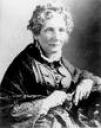 Harriet Beecher Stowe (14 June 1811 – 1 July 1896) was a famous American author who was active in the Cleveland lecture circuit and well known for her support of homeopathy, her abolitionist stance, and her campaigns for animal and women’s rights.
Harriet Beecher Stowe (14 June 1811 – 1 July 1896) was a famous American author who was active in the Cleveland lecture circuit and well known for her support of homeopathy, her abolitionist stance, and her campaigns for animal and women’s rights.
Beecher Stowe supported African American abolitionist and women’s activist Sojourner Truth, and raised funds for Myrtilla Miner, who devoted her life to educating African Americans.
In her writing Harriet Beecher Stowe described the terrible effects of the orthodox medicines of the day. She arranged for her father, Reverend Lyman Beecher, to have homeopathic treatment.
In 1846, Stowe also took the Elmira Water Cure with her sister Catharine and with homeopathic proponent Julia Ward Howe, author of the Battle Hymn of the Republic. At Brattleboro they took the cure alongside three hundred other women, including many from the south, an occasion described as a “national social experience.”
Harriet Beecher Stowe was also interested in animal rights, writing for the American Humane Education Society and became associated with the American Vegetarian Society, where she knew Louisa May Alcott‘s uncle, the reformer, physician and vegetarian, William Alcott.
Harriet Stowe’s husband, Calvin Ellis Stowe, was an educator and professor of religion and ancient languages. Always supportive of his wife, he found his own literary success in 1868 with his bestseller Origin and History of the Books of the Bible, written at his wife’s prompting.
Stowe is perhaps best known for her 1852 novel, Uncle Tom’s Cabin. The book was published by Boston publisher and homeopathic supporter John Punchard Jewett. She was also close friends with author Sarah Orne Jewett, who included homeopathic physicians as characters in her work. Uncle Tom’s Cabin, which attacked the cruelty of slavery, reached millions as a novel and play, and became influential, even in Britain. The impact was summed up in a commonly quoted statement, apocryphally attributed to President Abraham Lincoln. When he met Stowe, it is claimed that he said, “So you’re the little woman who wrote the book that started this great war!”


Leave A Comment